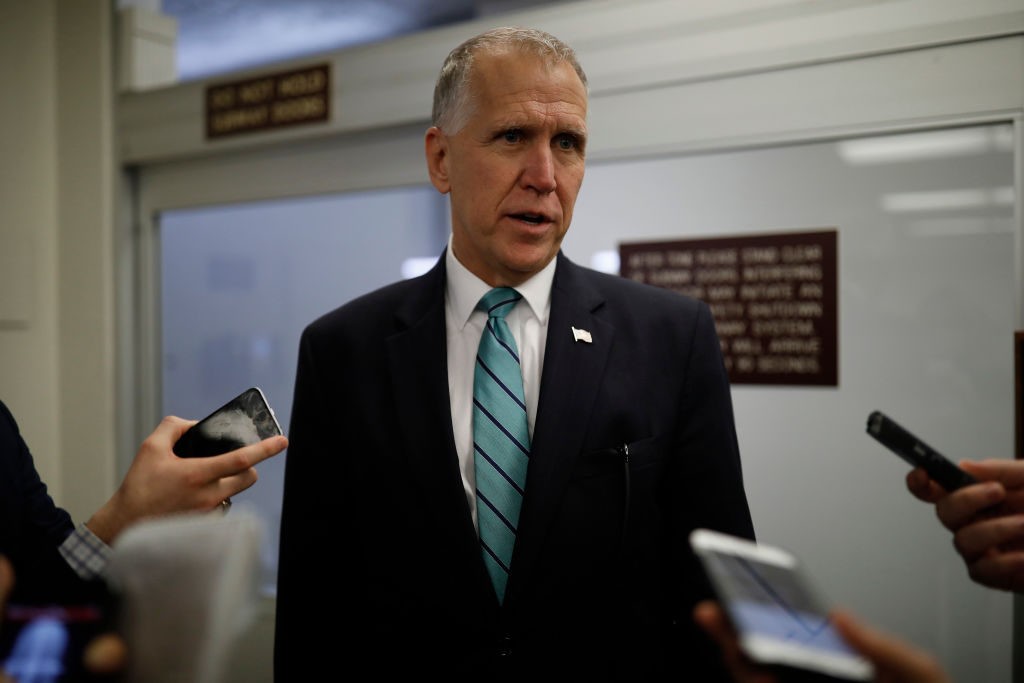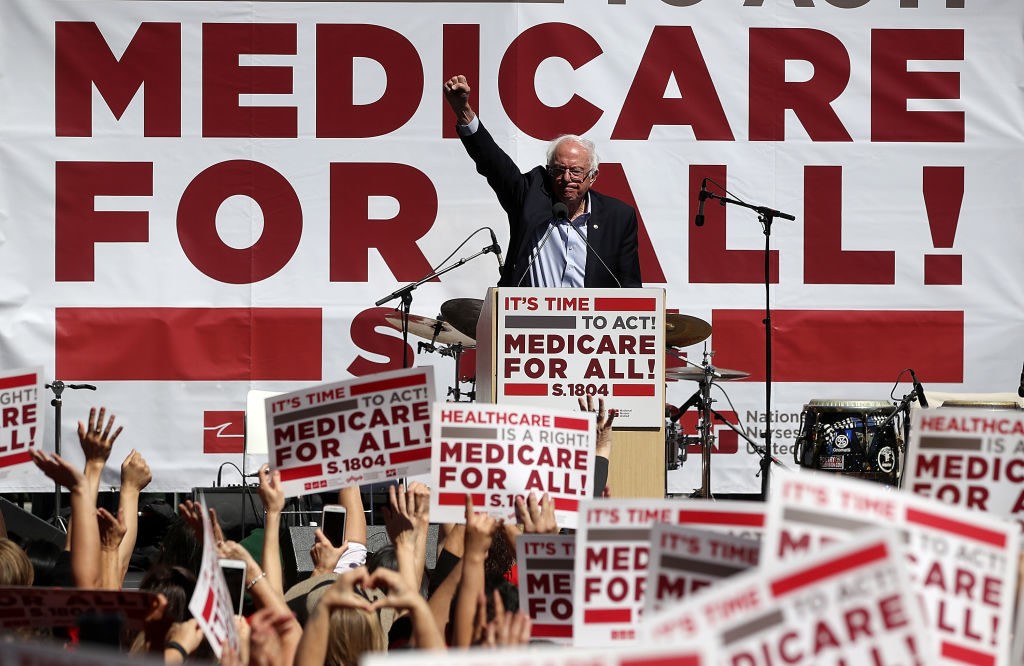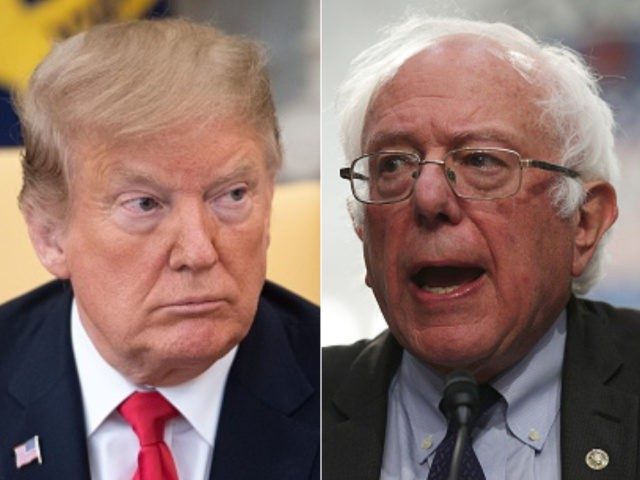Third of a series.
Healthcare for Everyone Sounds Good . . .
In Part One of this series, we considered the current state of play on the healthcare issue; that is, the Trump administration is challenging Obamacare in court, and the Democrats are rising strongly in defense of their cherished program.
In Part Two, we observed the changes in the healthcare issue over the last decade, since the 2010 enactment of Obamacare; over the years, the program has gone from being a political millstone around the neck of Democrats to a popular rallying cause—at least among Democrat voters.
So now let’s take a look at the healthcare issue as it’s playing out in our time: specifically, in the emerging face-off, President Trump vs. Sen. Bernie Sanders. Sanders, of course, is a longtime champion of “Medicare for All,” and he is now emerging as the front-runner in the Democrats’ 2020 nomination quest.
The looming Trump-Sanders confrontation flared on April 15, when Sanders defied the Democrat Party hierarchy and participated in a town hall on Fox News; it’s all part of his strategy to directly challenge Trump in Trump Country.
One notable moment in the Fox town hall came when Sanders turned to the live audience and asked for a show of hands to gauge support for his ambitious national health plan. The resulting headline in the Hill—vastly amplified when it was linked to by the Drudge Report—was catnip for Team Sanders: “Audience cheers ‘Medicare for All.’”
Now, of course, it can be objected that the Fox event could have been overweighted—perhaps even flooded—with Sanders supporters. Yet still, the story line of Sanders going into the Fox’s den made for a dramatic TV moment, and presidential campaigns are all about such moments and the messages they send.
Indeed, Sanders’ appearance triggered Trump; in a series of tweets, the president blasted not only “Crazy Bernie,” but also Fox News for its soft treatment of Sanders. (As any Fox viewer has noticed, the news side of Fox has changed a great deal in the last few years.)
So yes, Sanders has momentum; in fact, the RealClearPolitics polling average shows him slightly ahead of Trump.
. . . Until Americans Hear the “S” Word, Socialism
Yet Sanders shouldn’t get complacent, about either his candidacy or his healthcare cause. As they say, plenty of devils abide in the details of both.
For instance, as to Sanders’ prospects for entering the White House, we might wonder how his standing in the polls will hold up when the American people find out that the Vermont senator supports the right of felons to vote—while they are in prison.
And speaking of closer looks at Sanders, there’s the whole issue of socialism—you know, what they have in Cuba and Venezuela, among other bad places. As another Democrat presidential hopeful, Rep. Tim Ryan of Ohio, warns his party, it’s “dangerous” to let the “S-word” slip into the ’20 debate. For his part, Sanders is at pains to say he’s for the good kind of socialism, not the bad kind, and yet that distinction would be meaningful if he hadn’t been so praising of the bad kind, including in the old Soviet Union.
The same need to draw distinctions holds true for healthcare. Right now, the Democrats are in a good spot on healthcare; late last year, a Wall Street Journal/NBC News poll found that 45 percent of Americans said that Democrats would do a better job on healthcare policy, while just 27 percent said that Republicans would. And in fact, the Dems cleaned up in the 2018 midterms, largely because healthcare was the top concern.
Moreover, according to the RealClearPolitics polling average on Obamacare, support for that program scores a net positive of 11.4 percent; indeed, the Affordable Care Act is more popular now than it was at any time in the Obama years. To be sure, in years past, plenty of Republicans derided Obamacare as “socialism,” and yet, obviously, the charge didn’t stick, and for good reason; today, more than 156 million Americans have private health insurance.
So it’s little wonder that pragmatic Republicans are scrambling to stay on the opportune side of public opinion—that is, defending the most popular component of Obamacare.
One such pragmatist is North Carolina Republican Sen. Thom Tillis, who’s up for re-election next year. On April 10, Tillis and other Senate GOPers put themselves on record as supporting the protection of the insurance rights of those with pre-existing medical conditions. That was smart, because according to a recent poll from the American Cancer Society, between 68 and 82 percent of the population supports that goal.

Sen. Thom Tillis (R-NC) speaks with reporters on Capitol Hill in Washington, DC. (Aaron P. Bernstein/Getty Images)
We might add that guaranteed access to insurance is a pillar of any sort of national health system; in other words, Tillis and like-minded Republicans are edging closer to a consensus on the basic idea that national health insurance means just that—insurance for every citizen in the nation. In fact, public opinion is already there: A Pew Center poll shows such support at 60 percent, and a Politico/Harvard poll shows it at 68 percent.
Yet here’s the strange thing: Just at the moment when the Democrats seem to be clinching the consensus on national health insurance (defined as a mix of public and private), leading Democrats are moving the goalposts—to the left.
Specifically, Sanders and his energetic lefty allies, such as Rep. Alexandria Ocasio-Cortez, are pushing for actual socialism in healthcare. Indeed, for AOC, the ideal healthcare model is the Veterans Administration; as she said recently to a cheering audience in her New York City district, “If you ask me, I would like VA for all.”
Given the VA’s spotty history, we can see that these lefties are at risk of overplaying their hand—the country is on board with extending care to the uncovered, but not with no-choice socialism for those already covered.
We can see this risk when we look beyond the slogan, “Medicare for All.” While some polls have shown support for MfA as high as 70 percent, support ebbs if the proposed program seems too, well, governmental. For example, when people are asked what they think about “single payer”—that is, one government program for everyone, with no private insurance allowed—support falls to 56 percent, according to polling from the Kaiser Family Foundation.
To be sure, 56 percent is still a comfortable majority, but that number, too, is subject to being whittled down. An Associated Press headline explained it in January: “Support for ‘Medicare-for-all’ fluctuates with details.” As the AP put it, if Americans were told that a “government-run” system could lead to higher taxes, support fell to 37 percent; if Americans learned that it could threaten the existing Medicare program, support fell to 32 percent; and if it could lead to healthcare rationing, support fell to just 26 percent.

Sen. Bernie Sanders (I-VT) speaks during a healthcare rally at the Convention of the California Nurses Association/National Nurses Organizing Committee on September 22, 2017, in San Francisco, California. (Justin Sullivan/Getty Images)
So we can see: As a general concept, national health insurance is a popular idea. Thus if the Democrats can keep the healthcare issue at the level of generality, they’ll be okay—it’s those nasty details that can be diabolical.
And in fact, without many people noticing it—let alone challenging it—we’ve had a rudimentary program of national health insurance in place for more than three decades now. That program is the Emergency Medical Treatment and Labor Act, enacted by bipartisan majorities in both a Republican Senate and a Democrat House in the 99th Congress, which President Ronald Reagan signed into law on April 7, 1986. EMTALA required, and still requires, that hospital emergency rooms must take in all patients, without regard to ability to pay.
Obviously, EMTALA puts more of a burden on some hospitals than on others, and so the federal government established a special program to reimburse those hospitals most affected. So we can see: A costly national health program was in place for a quarter-century prior to Obamacare, and the country has been happy with it, obscure as it might be to both taxpayers and voters.
The lesson of both Obamacare and EMTALA seems to be this: If the program mostly seems to work, and doesn’t seem too upsetting, it becomes popular enough—at least after a while.
So now the question for 2020: Can the Democrats quietly champion a manageable national health plan, or will their avant-garde ideological ambitions get the best of them? That is, can they stay low-key, or will they turn the ’20 campaign into a zealous crusade against private health insurance? And also against consumer choice? And against middle-class values overall? The election could depend on the Democrats’ ability to keep their left wing from taking flight.
Getting people covered is popular. Socialism is not. And it’s worth remembering that “Sanders” is another word that starts with “S.”

COMMENTS
Please let us know if you're having issues with commenting.